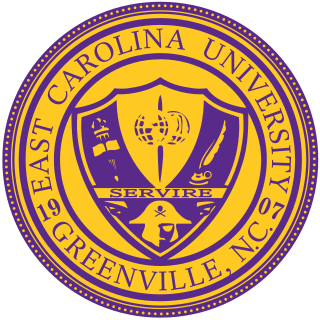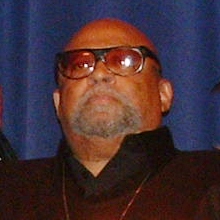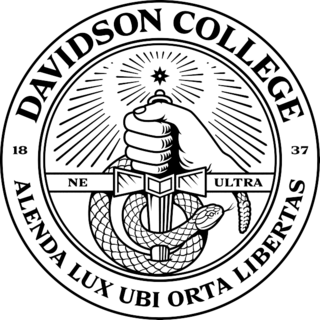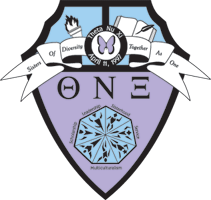Related Research Articles

Kwanzaa is an annual celebration of African-American culture from December 26 to January 1, culminating in a communal feast called Karamu, usually on the sixth day. It was created by activist Maulana Karenga, based on African harvest festival traditions from various parts of West and Southeast Africa. Kwanzaa was first celebrated in 1966. Estimates of how many Americans celebrate Kwanzaa have varied in recent years, from as few as a half a million to as many as 12 million.

East Carolina University (ECU) is a public research university in Greenville, North Carolina. It is the fourth largest university in North Carolina.

The University of North Carolina at Charlotte (Charlotte) is a public research university in Charlotte, North Carolina. UNC Charlotte offers 24 doctoral, 66 master's, and 79 bachelor's degree programs through nine colleges. It is classified among "R2: Doctoral Universities – High research activity".

Maulana Ndabezitha Karenga, previously known as Ron Karenga, is an American activist, author and professor of Africana studies, best known as the creator of the pan-African and African-American holiday of Kwanzaa.

Black studies or Africana studies, is an interdisciplinary academic field that primarily focuses on the study of the history, culture, and politics of the peoples of the African diaspora and Africa. The field includes scholars of African-American, Afro-Canadian, Afro-Caribbean, Afro-Latino, Afro-European, Afro-Asian, African Australian, and African literature, history, politics, and religion as well as those from disciplines, such as sociology, anthropology, cultural studies, psychology, education, and many other disciplines within the humanities and social sciences. The field also uses various types of research methods.

Davidson College is a private liberal arts college in Davidson, North Carolina. It was established in 1837 by the Concord Presbytery and named after Revolutionary War general William Lee Davidson, who was killed at the nearby Battle of Cowan's Ford.

Delta Sigma Theta Sorority, Inc. (ΔΣΘ) is a historically African American sorority. The organization was founded by college-educated women dedicated to public service with an emphasis on programs that assist the African American community. Delta Sigma Theta was founded on January 13, 1913 by twenty-two women at Howard University in Washington, D.C. Membership is open to any woman, regardless of religion, race, or nationality. Women may apply to join through undergraduate chapters at a college or university or through an alumnae chapter after earning a college degree.

Alpha Kappa Alpha Sorority, Inc. (ΑΚΑ) is the first intercollegiate historically African American sorority. The sorority was founded on January 15, 1908, at the historically black Howard University in Washington, D.C., by a group of sixteen students led by Ethel Hedgemon Lyle. Forming a sorority broke barriers for African American women in areas where they had little power or authority due to a lack of opportunities for minorities and women in the early 20th century. Alpha Kappa Alpha was incorporated on January 29, 1913.

The National Pan-Hellenic Council (NPHC) is a collaborative umbrella council composed of nine historically African American fraternities and sororities, commonly called the Divine Nine, and also referred to as Black Greek Letter Organizations (BGLOs). The NPHC was formed as a permanent organization on May 10, 1930, on the campus of Howard University, in Washington, D.C., with Matthew W. Bullock as the active Chairman and B. Beatrix Scott as Vice-Chairman. NPHC was incorporated under the laws of the State of Illinois in 1937.
While the traditional social fraternity is a well-established mainstay across the United States at institutions of higher learning, alternatives – in the form of social fraternities that require doctrinal and behavioral conformity to the Christian faith – developed in the early 20th century. They continue to grow in size and popularity.

Lambda Theta Nu (ΛΘΝ) is a Latina-based Greek letter intercollegiate sorority founded in 1986 at California State University, Chico.

Theta Nu Xi Multicultural Sorority, Inc. (ΘΝΞ) is a historically multicultural sorority founded on April 11, 1997, at the University of North Carolina at Chapel Hill (UNC), by seven women who sought to bridge cultural gaps. Theta Nu Xi was incorporated on April 29, 1999.

Sigma Lambda Upsilon (ΣΛΥ) or Señoritas Latinas Unidas Sorority, Inc. is a Latina-based sorority founded on December 1, 1987 at Binghamton University. The organization was created to promote academic achievement and serve the Latino community and the campuses that Sigma Lambda Upsilon serves. The sorority is now present in over 65 campuses. Though Latina-based, Sigma Lambda Upsilon Sorority, Inc. is a non-discriminatory organization. The sorority is a member of the National Association of Latino Fraternal Organizations (NALFO) and is its fourth oldest sororal member by founding date.

Bertha Pitts Campbell was a civil rights activist and one of the 22 founding members of Delta Sigma Theta Sorority, Inc.

Sarah Meriwether Nutter was one of the original sixteen founders of the Alpha Kappa Alpha sorority, the first sorority founded by African-American women. As an educator, she worked in the profession considered most critical to the advancement of African-American citizens.

Julia Evangeline Brooks was an incorporator of Alpha Kappa Alpha Sorority, Incorporated, the first sorority founded by African-American women. The sorority has continued to generate social capital for nearly 100 years.

Margaret Flagg Holmes was one of the sixteen founders of Alpha Kappa Alpha Sorority, Incorporated, at Howard University in Washington, DC. It was the first sorority founded by African-American women.

The Harvey B. Gantt Center for African-American Arts + Culture, formerly known as the Afro-American Cultural Center, is in Charlotte, North Carolina and named for Harvey Gantt, the city's first African-American mayor and the first African-American student at Clemson University. The 46,500 sq ft, four-story center was designed by Freelon Group Architects at a cost of $18.6 million — and was dedicated in October 2009 as part of what is now the Levine Center for the Arts.
Carver College was a junior college that served African American students in Charlotte, North Carolina. The college operated as the black counterpart to Charlotte College from 1949 to 1963. After merging with the Central Industrial Education Center, the school became Central Piedmont Community College.
References
- ↑ "NCBS Online - About NCBS". ncbsonline.org. Retrieved 2017-08-05.
- ↑ "Terms & Questions | 1968: A Global Year of Student Driven Change". www.blackstudies.ucsb.edu. Retrieved 2017-08-05.
- ↑ Asante, Molefi Kete; Mazama, Ama (2005). Encyclopedia of Black Studies. SAGE. ISBN 9780761927624.
- ↑ "Bertha Maxwell-Roddey, PhD - SC African American". SC African American. Retrieved 2017-08-05.
- ↑ "Delta Sigma Theta Sorority, Inc. - About Delta Sigma Theta". 2007-10-28. Archived from the original on 2007-10-28. Retrieved 2017-08-05.
- 1 2 3 Black Studies at University of North Carolina at Charlotte, Black Studies Brochure (Charlotte, North Carolina: UNC Charlotte, 1975-1976). Currently housed in the collection of the Smithsonian National Museum of African American History and Culture.
- 1 2 "NCBS Online - About NCBS". www.ncbsonline.org. Retrieved 2017-08-05.
- ↑ "Bill Text - ACR-71 Africana studies programs". leginfo.legislature.ca.gov. Retrieved 2017-08-05.
- ↑ "The Official Kwanzaa Web Site - Kwanzaa African American Celebration of Family, Community and Culture by Maulana Karenga". www.officialkwanzaawebsite.org. Archived from the original on 2012-08-15. Retrieved 2017-08-05.
- ↑ "NCBS Online - NCBS Civic & Community Education & Engagement Grants Program". www.ncbsonline.org. Retrieved 2017-08-05.